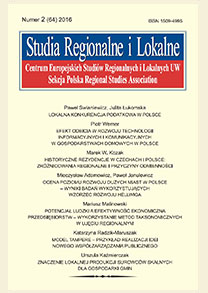Porządki chaosu. „Chaos” jako pojęcie i zjawisko empiryczne w Warszawie po 1989 r.
The orders of chaos. “Chaos” in post-socialist Warsaw as a concept and as an empirical phenomenon
Author(s): Joanna KusiakSubject(s): Social Sciences
Published by: EUROREG - Uniwersytet Warszawski, Regional Studies Association - Sekcja Polska
Keywords: chaos; Warsaw; post-socialism; fuzzy property; urban order
Summary/Abstract: The paper describes the “chaotic” transformation of Warsaw after 1989, and aims to analyze what Hegel calls “the work of the concept” of (urban) “chaos”, and to embed it in a theoretical framework. The author proposes a typology of urban chaos. The text analyzes the use of the term “chaos” in Poland and singles out particular contexts in Warsaw’s public discourse during the years of post-socialist transformation. Within these contexts, the author reconstructs the distinct social phenomena and power relations hidden beneath the superficial impression of chaos. Empirically, urban chaos is never mere randomness but rather a conglomerate of multiple pockets of order regulated by non-transparent power relations that only appear to be arbitrary. Using Hegelian language, one can argue that chaos is cunning. The key to understanding this cunning is the difference between “chaos” as a term used in public discourse and chaos as a structural condition of power relations between distinct pockets of order.
Journal: Studia Regionalne i Lokalne
- Issue Year: 15/2014
- Issue No: 55
- Page Range: 28-50
- Page Count: 23
- Language: Polish

